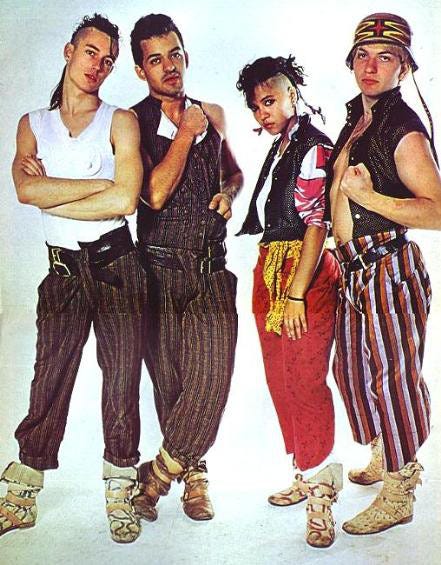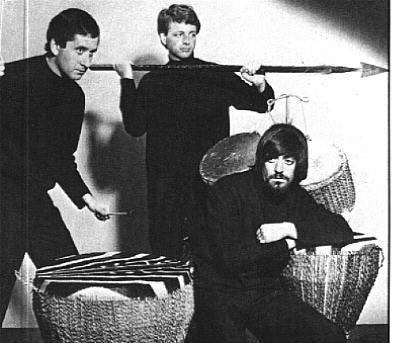Sheep Farmers, Bo Diddley, and Stanley Kubrick: The Improbable Story Behind “I Want Candy”
Released in the summer of 1982, Bow Wow Wow’s breakthrough single was a breath of fresh air. But unlikely a hit as it was, the song’s backstory is even weirder….
If you were scanning the airwaves in June of 1982, you might have heard something unusual issuing from your transistor radio. Squirming past the arena-prog of Asia’s “Heat of the Moment” and the fist-pumping sports-rock of Survivor’s “Eye of the Tiger” was a song led by a tribal and surfy tom-tom beat. A few bars later came a crunching electric bass and an irresistible melody on the guitar. By the time the vocals kicked in—sung by a perky-sounding young woman spinning a playground rhyme about a “guy who’s tough but sweet”—it was all over: Like sugar itself, this song was going to be tough to quit.
Bow Wow Wow’s “I Want Candy” was one of the defining moments of New Wave, an earworm that continues to work its magic decades after the band dissolved into acrimony, lineup changes and—worst of all—competing Facebook pages. No surprise there: Bow Wow Wow was a wholly constructed entity, a punk-pop confection masterminded by impresario Malcolm McLaren. After the Sex Pistols imploded, he poached Adam Ant’s backing band, suggested a world music bent inspired by the “Burundi Black” album—a strange hybrid of field recordings and Western pop arrangements—and paired the skeptical musicians with one 14-year-old Annabelle Lwin, whom he’d “discovered” working at a dry cleaners. The arrangement didn’t last but the band did produce some memorable music, notably their debut single “C-30 C-60 C-90 Go.”
But “I Want Candy” didn’t begin with Bow Wow Wow. It was first performed in 1965 by a band called The Strangeloves. And, well…strangely, their story is even odder than Bow Wow Wow’s, a reminder that—in pop as in life—image has a way of trumping substance.
Straight Outta Queensland
The Strangeloves were a trio of Australian brothers—Miles, Giles, and Niles Strange—saddled with the unlikeliest of backstories. Raised on a remote sheep farm, they’d made a fortune pioneering a new method of sheep crossbreeding—producing the long-haired “Gottehrer” variety (as registered with the Feldman-Goldstein Company of Australia). Now they’d “retired” to spend their days crafting quirky rock songs.
If this sounds a bit too improbable to be true, that’s cause it ain’t. In reality, The Strangeloves were the Brill Building songwriting team of Bob Feldman, Jerry Goldstein, and Richard Gottehrer. Based in New York—not New South Wales—they’d scored a major hit with “My Boyfriend’s Back” for the Angels in 1963. Recognizing that girl groups were being displaced from the charts by British Invasion bands, the team styled themselves into a ready-made Beat group. But there was a problem: Because the trio couldn’t pull off British accents, they took on fake Australian identities, naming their band after Stanley Kubrick’s recent hit film.
Ignoring the question of exactly why Feldman, Goldstein, and Gottehrer decided to turn a conventional songwriting collaboration into a piece of performance art, the trio cut a single—“Love, Love (That’s All I Want From You)”—and released it on Swan Records, where it did nothing. For their next effort they cut a version of “Bo Diddley” but Swan passed. Next they tried Atlantic, where Jerry Wexler informed the band he wasn’t interested in releasing a recording of white guys singing “Bo Diddley.” But Ahmet Ertegun suggested they bring the track to up-and-coming producer Bert Berns to see what he thought.
Berns pointed out that if the group changed the lyrics and melody but kept the same backing track, they could claim the copyright in the resulting song themselves. Berns co-wrote a new lyric inspired by the novel “Candy,” a satirical pornographic novel co-written by Terry Southern (who’d also co-written the screenplay to “Dr. Strangelove”). Regardless of its utter implausibility, the plan worked. In August of 1965, The Strangeloves’ second single, “I Want Candy,” shot to #11 on the Billboard Hot 100.
Sidebar: These days, Bo Diddley (or at least his estate) could claim copyright protection (look up “Blurred Lines copyright case” for context). But in 1965, there were no such protections for a song’s “groove” or “feel,” making Diddley one of the most ripped-off songwriters of all time.
Real-Life Issues
Now the trio had a new problem: They had to perform. After a few uncomfortable live appearances, the songwriters simply hired the session players who’d recorded the song to provide instrumental backing. During one such gig in Ohio, the “original” Strangeloves (that is, Feldman, Goldstein, and Gottehrer) shared the stage with a band called Ricky Z and the Raiders. Impressed by 16-year-old Rick Zehringer—soon to become Rick Derringer—Feldman and company brought him to New York to sing over a track on The Strangeloves’ forthcoming album. The song, “Hang on Sloopy”—credited to “The McCoys,” perhaps to imply how “unreal” they were—was a smash hit, going to #1 in October 1965.
As for The Strangeloves, they’d release several more singles over the coming years, none of which made a dent in the charts—not even in Australia, where, unsurprisingly, no one seemed to buy their cover story. Admittedly, the band’s impact may have been dissipated by their practice of crediting releases to different artists, including “The Sheep,” “Rome & Paris” and, most memorably, “The Rock & Roll Dubble Bubble Trading Card Co. of Philadelphia 19141.”
Years later, Richard Gottehrer would resurface and play a not-insignificant part in the early New York punk scene, among others. After co-founding Sire records with Seymour Stein, he’d go on to sign the Ramones, Blondie, Talking Heads and a young unknown named Madonna.
It’s fitting that a chain of tall tales and music-industry string-pulling produced “I Want Candy”—that catchiest earful of spun sugar. While neither The Strangeloves nor Bow Wow Wow would have a massive effect on pop culture, for brief moments they both made a delightful and inescapable noise.
Now, who wants some candy?





My daughter’s middle name was Annabella. She never liked it. Her full name was Mowgli Annabella Gillogly
Never knew the backstory behind the song! Great read! Perfect timing as well, have been recently listening to a lot of Bow Wow Wow and early 80s English Punk and New Wave. I moved my band from Oakland to Guilford in 85 and as I write about it I’ve been diving back into all the great music from that era.